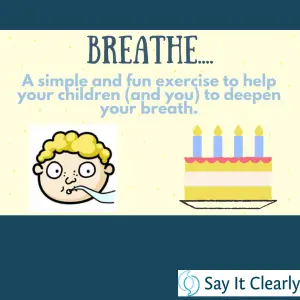5 tips if you are concerned about your child’s speech.
 This week the focus is on children’s speech. What to look out for if you think they might be experiencing difficulties with their speech. If you are wanting to make sure they get the best start with their learning then definitely start with their speech.
This week the focus is on children’s speech. What to look out for if you think they might be experiencing difficulties with their speech. If you are wanting to make sure they get the best start with their learning then definitely start with their speech.
The following are my top tips to help with your child’s speech, especially if you are concerned with any difficulties they might have, for example, when other people find it really hard to understand them when they speak even though you can. If you don’t have children feel free to share this with people who you know who do.
- Playing time. Play-based learning is the only way for very young children to learn. What I mean by that is, it is the best way for children to learn. Children’s brains grow when they play, develop motor skills, test working theories, develop a real sense of safety, communicate, challenge themselves, make decisions …a whole raft of complex processes take place. It is our job as parents and educators to respond to babies and young children in such ways as to develop them further. Look them in the eye, talk to them, sing to them, cuddle, hug, and kiss them. All of these fire the neurons in their brains and what fires, wires. You’re wiring in that love and care. It gives them a sense of safety so they can go out and take safe risks to grow.
- Talking time. When you are speaking with young children the most important thing is facing them, children learn by doing so if they can see your mouth as you speak they are more likely to pick up sounds correctly. Eye contact gives them a greater sense of safety and that you are listening to them.
- Listening time. This may be challenging if you are super busy, but even 3 minutes of close listening will add huge benefits to not only your child’s speech but also their sense of security and love. Close listening involves looking at them when they are speaking and doing nothing else, just listening. Add in affirmative sounds and words, mmm, hmm, right, cool, ok. You could ask a question or two to clarify but rule of thumb is 4 statements or one word response so they know you are listening and then 1 question.
- Body language. Match their body language, this inherently gives them the knowledge that you are listening and responding. Watch their pupils dilate as you do this, they are happy that you are giving them your full attention and will chat away, which is great for speech in general but also if your child is experiencing challenges.
- The ‘don’ts’ Most definitely don’t judge or criticize (you are so stupid, why would you do that?). By the same token don’t go over the top with fake compliments; you’re so clever, you’re so amazing (rather, tell them what specifically they have done or said and compliment that. More on this fixed mindset type of praise later and why it can be dangerous. Minimalise their concerns (oh, it’s no big deal, you’ll be right, try instead to get them to name their emotions and let them know it’s ok to feel those emotions but to try anyway).
These 5 tips to help your child’s speech aren’t hard, they don’t really take too long but they are vital in helping to grow children into adults who have the ability to express themselves clearly and confidently.
If you would like more techniques, strategies and exercises to help, grab the ebook off Amazon (it’s only USD9.99) or the online course you can access and go through the 3-5 minute videos with them. There’s also supportive written materials too.
Any questions do get in touch.
Have a great week, Miriam.
